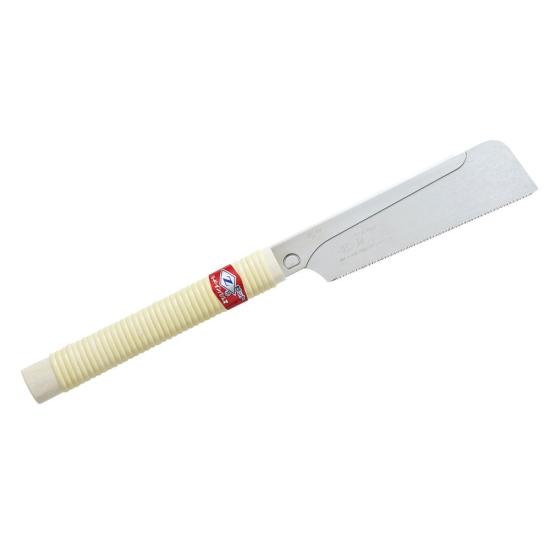ZetSaw (Z-saw for short) produces 2 versions of their popular Dozuki saw: Hardwood and Fine. Each saw has different tooth patterns. Hardwood saws have 21 TPI and are designed to cut harder woods like oak, walnut and cherry and can rip, crosscut or cut angles equally well. Hardwood saws are ideal for cutting dovetails and tenons. Fine saws have 25 TPI and are designed to cut pine, cedar and fir and are best for crosscutting. Fine saws are ideal for extremely intricate and precise cutting. Both Hardwood and Fine saws come with either 150 mm (5.9") or 240 mm (9.44") blades.
Specifications: Hardwood 150 mm /5.9" Overall length: 372mm/14-5/8"
Blade length: 150 mm/5.9"
Blade thickness: 0.3mm/0.011"
Kerf: 0.4mm/0.015"
Blade depth: 38mm/1-1/2"
Maximum depth of cut: 38mm/1-1/2"
Pitch/TPI: 1.2mm/21 TPI
Traditional rattan cane wrapped wood handle
Replacement blade sold separately: 07106
Hardwood 240 mm/9.44" Overall length: 535mm/21-1/16"
Blade length: 240 mm/9.44"
Blade thickness: 0.3mm/0.011"
Kerf: 0.4mm/0.015"
Blade depth: 50mm/1-15/16"
Maximum depth of cut: 1-15/16"
Pitch/TPI: 1.2mm/21 TPI
Traditional rattan cane wrapped wood handle
Replacement blade sold separately: 07124
Fine 150 mm/5.9" Overall length: 372mm/14-5/8"
Blade length: 150 mm/5.9"
Blade thickness: 0.3mm/0.011"
Kerf: 0.4mm/0.015"
Blade depth: 38mm/1-1/2"
Maximum depth of cut: 38mm/1-1/2"
Pitch/TPI: 1mm/25 TPI
Traditional rattan cane wrapped wood handle
Replacement blade sold separately: 07104
Fine 240 mm/9.44" Overall length: 535mm/21-1/16"
Blade length: 240 mm/9.44"
Blade thickness: 0.3mm/0.011"
Kerf: 0.4mm/0.015"
Blade depth: 50mm/1-15/16"
Maximum depth of cut: 1-15/16"
Pitch/TPI: 1mm/25 TPI
Traditional rattan cane wrapped wood handle
Replacement blade sold separately: 07121
The primary difference between Japanese saws and western-style saws is that Japanese saws cut on the pull stroke. Pulling a saw blade through wood keeps the blade in constant tension preventing the blade from bowing allowing the blade to be much thinner. Thinner blades cut faster with less effort, make less sawdust and produce a much finer cut. Japanese saws have less set (offset of the teeth) providing much better control when following a line. Japanese saw teeth are impulse hardened greatly prolonging the life of the saw. Impulse hardening heats the cutting edge of each tooth via electrical current hardening just the surface of the tooth leaving the core flexible and less susceptible to breaking. Impulse hardened teeth will remain sharp much longer than conventional western handsaws. Most Japanese saws cannot be sharpened, but replacement blades are available. Japanese saw blades receive a special micro-thin electroplated surface treatment that minimizes friction, reduces tarnishing and rusting and increasing durability.
Japanese saws come in 3 main types:Dozuki: In Japanese Dozuki means “attached trunk” and refers to the stiff rib or spline that supports the blade. Blades on these saws are super thin and can be as thin as 0.3 mm or 0.011”. These saws are designed for crosscutting and can produce very precise and smooth cuts. These saws have backs or splines to keep the super thin blade in tension. These saws are the easiest to control, but the spline limits the overall depth of cut.
Ryoba: The Japanese word Ryoba means “double or both edge”. These saws have teeth on both sides of the blade. One side has coarse teeth and is designed for ripping while the other side has finer teeth and is designed for crosscutting. These saws have thicker blades, are much sturdier and allow deep cuts.
Kataba: In Japanese Kataba means “single edge”. These saws have teeth on just one side of the blade and do not have backs or splines. These saws can have teeth specifically designed for ripping, crosscutting or angle cutting. These saws have thicker blades and no backs or splines, so they excel at making deep and long cuts.


